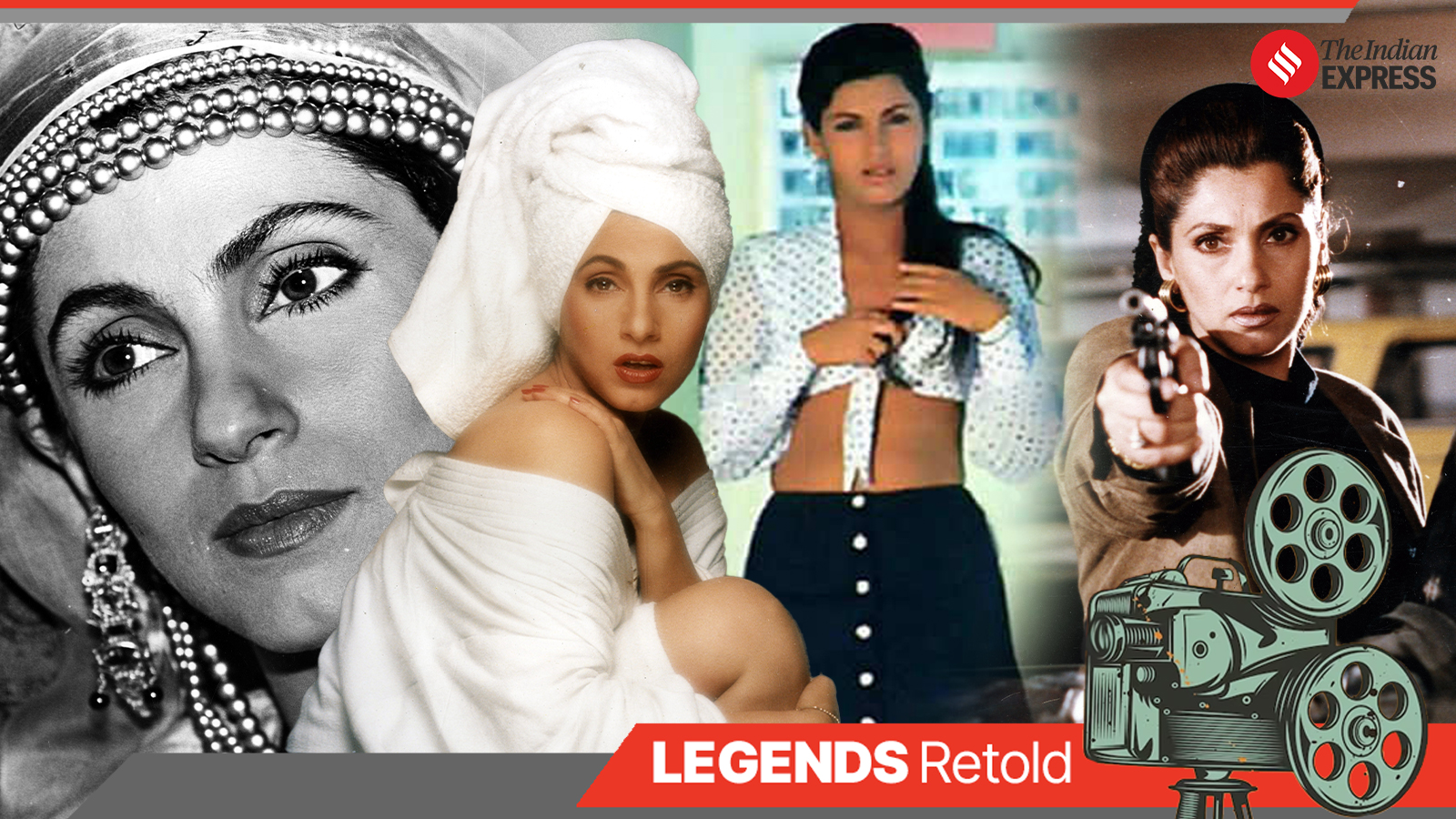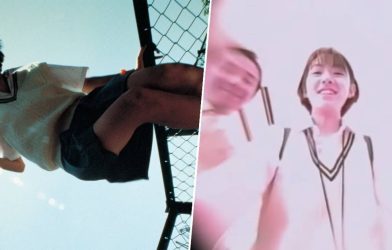Dressed in a black miniskirt and white front-knot blouse with polka dots (which came to be known as Bobby prints), she floored the nation with her innocence and big expressive eyes, becoming the sweetheart of the ‘70s.

Dimple’s marriage to Khanna, the reigning superstar of Bollywood in the early 70s, naturally came as a shock to many. She was just 16 when she tied the knot with Khanna, who was in his 30s, within days of meeting him. She quit acting to focus on her marriage and raising her two daughters, Twinkle Khanna (born in 1974) and Rinkie Khanna (1977). “I came to know him well precisely seven days before the marriage. We were going together to Ahmedabad for some kind of a show on a chartered flight. He sat next to me all along but did not utter a word. Just as the flight was about to land, he turned towards me, looked hard into my eyes, and said he wanted me to marry him,” read an excerpt from Dimple’s interview published in India Today. The marriage didn’t fare well and Dimple returned to cinema after a hiatus of 13 years.

Her return to cinema
Dimple’s personal life soon took a tumultuous turn. Her marriage with Khanna began to fall apart as his stardom began to fade, something both couldn’t handle well. They eventually parted ways in 1982 but never divorced. “The life and happiness in our house came to an end the day I and Rajesh got married. I was too young to realise the importance of Bobby for my career, but from the day I entered Rajesh’s house, Ashirwad, I somehow knew that the marriage wouldn’t work,” she was quoted saying in an interview.


For many, this setback might have spelled the end of a promising career, but for Dimple, it was just the beginning of a new chapter. Just a film old, estranged from her husband and a mother of two — the industry isn’t kind to women with labels and tags — Dimple defied the norm. She was away from the silver screen for over a decade but when she returned to films, she made the audience fall in love once again. Despite her comeback film, Zakhmi Sher (1984) turning out to be a disaster, her next film with her Bobby co-star was turning point. She played Mona D’Silva — a woman torn between love and duty — in Ramesh Sippy’s Saagar (1985) opposite Rishi and Kamal Haasan.

Mona was not the stereotypical heroine often seen in Bollywood films. Instead, she was portrayed as a modern, independent woman who defied traditional expectations. Mona was a confident and assertive individual, unafraid to pursue her desires and make her own choices, even if they went against societal norms. Saagar won her Filmfare Awards for Best Actress and there was no looking back for her. With each role, she defied expectations and carved her niche in an industry dominated by stereotypes.


“It is not the audience who rejects us; it is the people in the industry who believe that once you are married you are not desirable to the audience. I think I proved them wrong,” she told Rediff while discussing her return to cinema.
Evolved woman, nuanced actor
When Dimple burst onto the Indian film scene as a teenager in Bobby, her innocent charm and vivacious presence made her an instant sensation. However, as she grew into her late 20s, the Dimple of the past had transformed, shedding her youthful innocence and emerging as a woman of substance. Beneath the surface, the metamorphosis of Dimple was a blend of inner strength, newfound confidence, and a keen understanding of her own identity, which was reflected in the kind of films she chose and the roles she essayed. Her personal crisis shaped her into an actor par excellence. Sippy, who directed her, described her as “grown-over-the-years,” comparing her with Dimple who debuted with Bobby at the age of 16. Speaking of Dimple, Feroz Khan, who directed her in Janbaaz, said, “No other girl has so much pent-up aggression.”

Early in her career, her roles often focused on her beauty and her glamorous look, but she actively sought to challenge this image and showcase her wider talent. She impressed critics with her performances in both mainstream and independent cinema and tackled a variety of characters, including those grappling with marital issues. Some saw parallels between these troubled characters and her own life experiences. Her performances in films like Kaash (1987), Drishti (1990), Lekin… (1991), and Rudaali (1993) garnered significant acclaim. She also delivered noteworthy supporting roles in crime dramas like Prahaar (1991), Angaar (1992), Gardish (1993), and Krantiveer (1994), winning another Filmfare Award for the latter.

Many from the industry said that her memorable performances and the pain she depicted on-screen came from her personal suffering. Her fellow actor, Zeenat Aman, once described Dimple, “You look at her on a long shot. You see a good body, but there are many such that you’re sure to find all around. Move the camera closer. Well, a remarkable face, something that always seems freshly washed, but made somewhat alien-looking with that longish nose of hers and the watery eyes. But now look at her big close-up. It is not at all the face of a woman who is acting her part: she is a woman who is just dying to be herself on screen.”
Dimple herself spoke about her tragedies contributing to her on-screen persona and realistic acting. She said, “I think all my life’s story is condensed in my face. It is neither innocent nor coy. It speaks volumes.”
ALSO READ Kamal Haasan’s Indian re-releases in Chennai, fans burst crackers inside theatre. Watch
Prioritising meaty roles and breaking the mould
By simply being herself, Dimple brought a natural vulnerability and authenticity to her roles. Filmmaker Mahesh Bhatt, who cast her in Kaash, applauding her phenomenal acting said that Dimple needn’t study method acting to bring “authenticity” to her roles as her life experiences had already ingrained her with a depth of emotion and understanding that added a layer of realism to her performances. No wonder she regretted rejecting Amitabh Bachchan’s Mard (1985) and “prancing around like a monkey” in Pataal Bhairavi (1985) because the film offered her more money. “It was bloody stupid of me to refuse Manmohan Desai’s Mard opposite Amitabh Bachchan. I am really crazy, you know. Here I turn down a Manmohan Desai film and on the other hand, I go and accept a stupid song and dance in Pataal Bhairavi for no earthly reason. I could have cried and run off when I turned up on the sets and realised what they expected me to do. Imagine prancing around like a monkey just for cash. And yet I turned down an offer with Amitabh just because we couldn’t agree on what I should be paid!”

In her film, Rudaali (1993), Dimple’s portrayal of Shanichari, a professional mourner known as a ‘rudaali,’ was a departure from her previous roles. It required her to delve deep into the psyche of a woman who suppresses her emotions as part of her profession. While the film’s narrative delves into themes of societal oppression, gender roles, and the plight of marginalised communities in rural India, the actor’s performance garnered widespread critical acclaim. She received several awards, including the National Film Award for Best Actress and the Filmfare Award for Best Actress, for her nuanced portrayal. The same year, Dimple acted in Mrinal Sen’s Antareen. The film was a poignant reflection of her own life, both on and off the screen and explored the intricacies of human relationships and the complexities of love, with Dimple portraying the character of Ashalata, who was caught in a loveless marriage. Her performance was appreciated while the film bagged the National Film Award for Best Feature Film in Bengali.
Never too old to reinvent
In the late ‘80s and throughout the ‘90s, we saw Dimple in various avatars, stepping into roles that were career-defining for her in many ways, but in the year 2001, even at 44, she didn’t fail to surprise her audience, thanks to her ability to reinvent and keep up with the changing times. In Farhan Akhtar’s Dil Chahta Hai, she played Tara Jaiswal, an older woman who falls in love with a younger man played by Akshaye Khanna. It was not just a one-dimensional character; she was portrayed as a woman with her own aspirations, desires, and emotional complexities. Dimple brought depth and nuance to the role, showcasing Tara’s vulnerability, strength, and inner conflicts with sensitivity and authenticity. When the film turned 20, Farhan took to X and revealed that if she would’ve said no, he’d probably have had to scrap making the film. “Tara was written for you and thank my lucky stars that you said yes. Forever grateful. #DimpleKapadia,” he added.

Dimple became more selective about her roles with substantial gaps in her career over the ensuing decades. However, she continued to captivate audiences, notably with her performance as the title character, a middle-aged professor, in the American production Leela (2002), who was desired by a younger man, again a role written specifically for her. In the coming years she appeared in films like Hum Kaun Hai? (2004), Pyaar Mein Twist (2005), Phir Kabhi (2008), Tum Milo Toh Sahi (2010), Being Cyrus (2005), Luck by Chance (2009), Dabangg (2010), Cocktail (2012), and Finding Fanny (2014).
Dimple flipped the script once again with her role of Priya, an arms dealer from India, in Christopher Nolan’s Tenet (2020), marking a significant milestone in her career. Despite the film’s star-studded cast, including John David Washington, Robert Pattinson, and Kenneth Branagh, her performance stood out.

Nolan couldn’t stop praising Dimple for her ‘charisma, poise and her depth of experience’. “When I turned up in Mumbai with my video camera and asked her to perform a couple of scenes. I asked her to do things in different ways. Her skill and charisma were immediately apparent, and it was very much what I wanted for that character. So I was very excited to have found someone who I knew could take what I had hoped for, what I had put on the page, and take it to the next level,” he told India Today.

At 67, she is unstoppable! Last year, she was seen in Pathaan and Tu Jhoothi Main Makkaar, and Disney Plus Hotstar series, Saas, Bahu Aur Flamingo. She was also seen in Teri Baaton Mein Aisa Uljha Jiya earlier this year.

In Saas Bahu Aur Flamingo, she was all guns blazing in the role of Savitri, a powerful matriarch who runs a drug cartel. The role deviates from the traditional, submissive mother or mother-in-law roles often seen in Indian cinema, showcasing a strong, assertive, and ruthless woman leading a criminal empire, performing action scenes. Ask her what keeps her going and she says she “works like a maniac.” “I’m like a craving maniac… I forget my sleep, my food and I am 24/7 hyper. I drive myself sick with worry. I’m crazy. I don’t like that about myself, but that’s me. I can’t help it. Maybe that works for me,” she told PTI in an email interview.
Dimple metamorphosed from innocent fisherman’s daughter Bobby, to drug cartel matriarch Savitri. Over the decades, despite her tumultuous life and failed relationship, she has successfully transitioned from Bollywood films to international cinema and web series, and continued to stay relevant because she rose from the ashes. Actors like Alia Bhatt, Kareena Kapoor Khan and Anushka Sharma, among are asked questions about juggling motherhood and career, but Dimple raised her two daughters as a single mother and achieved immense success and critical-acclaim in her career as Bollywood’s leading lady.









